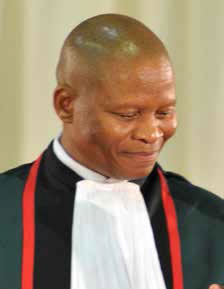The independence of the courts and the rule of law can only prosper where there is a clear separation of powers.
 This is according to Minister of Justice and Correctional Services Michael Masutha, who recently announced that staff from the Department of Justice would be transferred to the office of Chief Justice Mogoeng Mogoeng.
This is according to Minister of Justice and Correctional Services Michael Masutha, who recently announced that staff from the Department of Justice would be transferred to the office of Chief Justice Mogoeng Mogoeng.
A total of 1 486 staff, who perform administrative duties supporting judicial functions in superior courts such as the Constitutional Court, Supreme Court of Appeal and High Court, now belong to the Office of the Chief Justice as of October this year.
“The Department and the Office of the Chief Justice were working tirelessly to ensure that the transition happens without glitches,” said Minister Masutha.
The Office of the Chief Justice was given a provisional budget of R1,4 million for the year with plans in place for it to receive its own budget.
Minister Masutha added that lower courts such as Magistrate’s and Sexual Offences Courts would remain in his department.
He added that this was a step in the right direction in the quest for a transformed and accessible judicial system as specified in the National Development Plan (NDP).
South Africa’s judicial system
The Constitution is the supreme law of the country and binds all legislative, executive and judicial organs of state at all levels of government.
The judiciary is separated into different courts, each with different functions.
Constitutional Court
The Constitutional Court is the highest court in South Africa. It consists of 11 judges who protect the Constitution and human rights.
The court deals with cases sent to it by the High Court and these cases have to do with constitutional issues. Normal appeal matters are dealt with at the Supreme Court of Appeal.
Supreme Court of Appeal
The Supreme Court of Appeal (SCA) is based in Bloemfontein, in the Free State. It only deals with cases sent to it from the High Court.
Three to five judges listen and decide on all cases of the SCA. The final decision of the SCA is the one supported by most of the judges listening to the case.
High Court
High Courts usually only hear civil matters involving more than R100 000, and serious criminal cases.
They also hear any appeals or reviews from lower courts Magistrates’ courts, which fall in their geographical jurisdiction.
There are 14 provincial divisions of the High Court in South Africa.
Magistrates' Court
Magistrates’ Courts are the lower courts, which deal with the less serious criminal and civil cases. They are divided into Regional Courts and District Courts. In criminal matters a district court has jurisdiction over all offences except treason, murder and rape, and a regional court has jurisdiction over all offences except treason.
Small Claims Courts
Small Claims Courts have jurisdiction to hear any civil matter involving amounts less than R 12 000. They exist to make the court process quicker and cheaper. There is no magistrate or judge at the Small Claims Court, but the presiding officer is a commissioner who is usually a practicing advocate or an attorney who acts as a commissioner.
The commissioner listens to both sides and asks all the questions. You cannot use a lawyer in the Small Claims Court, but you can get advice from a paralegal or a lawyer to prepare
for your case.
No appeal may be filed against the judgment or order of the Small Claims Courts.
Equality Courts
Equality Courts have been set up to help those who believe they have suffered unfair discrimination, hate speech or harassment.
Anyone can take a case to the Equality Court, even if you are not directly involved in what happened.
Sexual Offences Court
Special Sexual Offences Courts have been set up across the country. They are built in such a way that children and victims get the necessary care, respect and support at the court.
There is a waiting room to make sure that the victim of a sexual offence does not come in contact with the person accused.
Further information visit: www.justice.gov.za



 Facebook
Facebook Twitter
Twitter WhatsApp
WhatsApp